Homemade or Store-Bought Baby Food?
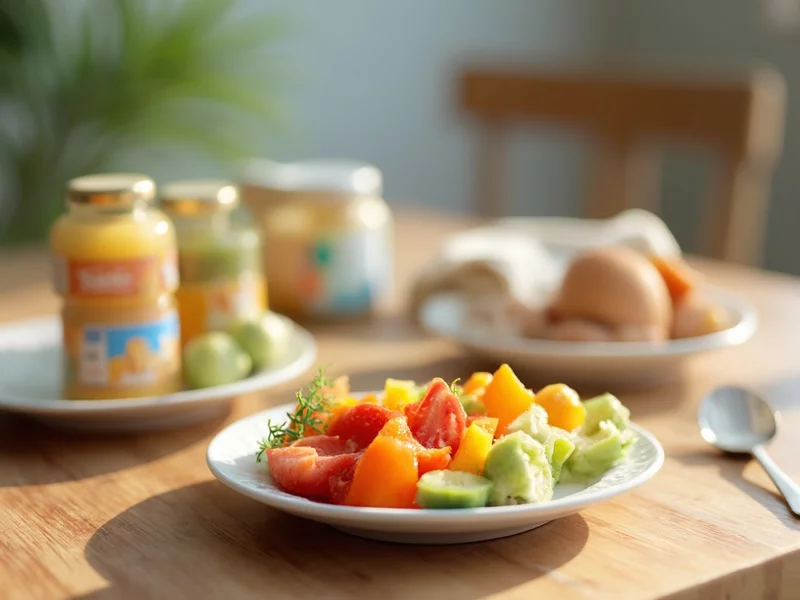
As you navigate the maze of baby food options, consider this: the choice between homemade and store-bought baby food can significantly impact your child's health and development. Are you ready to empower your family's nutrition journey?
What You Will Learn
- Homemade baby food allows for complete control over ingredients, enabling fresher meals tailored to your baby's needs.
- Store-bought baby food often contains added vitamins and minerals, providing convenience and nutritional assurance for busy parents.
- Key nutrients to prioritize in baby food include iron, calcium, folic acid, and omega-3 fatty acids, essential for your baby's growth.
- Organic baby food options eliminate harmful pesticides and artificial ingredients, making them a safer choice for your child.
- Safety considerations for both homemade and store-bought baby food involve understanding contaminants, proper food handling, and storage methods.
- Combining homemade and store-bought options can add variety to your baby's diet, accommodating their evolving taste preferences.
- Proper storage of baby food is critical; homemade should be stored in airtight containers and used within three days, while store-bought must be checked for expiration dates.
Homemade vs. Store-Bought Baby Food: A Comparative Overview
This visual compares key aspects of homemade and store-bought baby food, focusing on nutritional control, convenience, and safety considerations to help parents make informed choices.
Homemade Baby Food
- ✓Full control over ingredients
- ✓Fresher produce & unique flavors
- ×Requires time for preparation
- ×Proper handling & storage essential
Store-Bought Baby Food
- ✓Convenient & time-saving
- ✓Often fortified with key nutrients
- ×Less control over ingredients
- ×Potential for contaminants/additives
Nutritional Considerations
- ✓Iron: Brain development
- ✓Calcium: Strong bones & teeth
- ✓Folic Acid: Cell growth
- ✓Omega-3: Brain health
Safety & Storage Tips
- ✓Homemade: Airtight containers, 3 days fridge/freeze
- ✓Store-bought: Check expiration, follow guidelines
- !Organic: Safer choice, fewer pesticides
- !Avoid added sugars & artificial preservatives
The Essential Guide to Homemade vs. Store-Bought Baby Food for Optimal Baby Health
As parents, we want the very best for our little ones, especially when it comes to their nutrition. Deciding between homemade and store-bought baby food can feel like navigating a maze. Each option has its advantages and potential pitfalls. Let's explore this together to help you make informed choices for your baby’s health!
In this section, we will compare the nutritional aspects of homemade and store-bought options, evaluate safety concerns, and offer practical tips for your family. Understanding these factors will empower you as you embark on your baby’s food journey! For more insights into your options, check out our guide on the best baby food shopping guide.
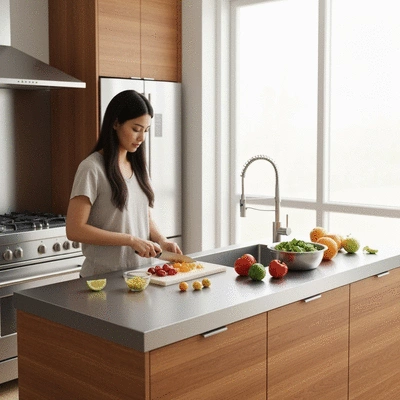
Understanding the Nutritional Landscape of Baby Food
When it comes to baby food, nutrition is the cornerstone of our choices. Each option—homemade or store-bought—comes with its unique set of nutritional profiles. Let's take a closer look at what each can offer your little one!
- Homemade Baby Food: You control the ingredients, which means you can choose fresh, organic produce packed with nutrients.
- Store-Bought Baby Food: Often fortified with vitamins and minerals, these options can also provide convenience for busy parents.
- Personal Preference: Your baby’s tastes may dictate which option is more successful during mealtimes!
As you weigh your options, keep in mind that the right choice often lies in a combination of both homemade and store-bought foods. Many parents find a mix works best for their family's routine and their baby’s preferences.
Comparing Nutritional Profiles: Homemade vs. Store-Bought Options
Understanding the nutritional profiles of homemade and store-bought baby food is crucial. With homemade baby food, you can ensure that every ingredient is fresh and tailored to your baby's needs. This means you can introduce unique flavors and nutrients that store-bought options may not always provide.
On the flip side, store-bought baby food often undergoes rigorous testing to ensure safety and nutritional adequacy. Fortification with essential vitamins like iron and zinc can be a significant benefit for infants who may need an extra boost. For a deeper dive into what nutrients your baby needs, read our nutrient-rich baby foods guide.
Key Nutrients Your Baby Needs: What to Look For
When selecting baby food, it's vital to consider the nutrients that support your baby's growth and development. Here are some key nutrients to look for:
- Iron: Essential for healthy brain development.
- Calcium: Important for strong bones and teeth.
- Folic Acid: Crucial for cell growth and metabolism.
- Omega-3 Fatty Acids: Beneficial for brain health, especially as your baby begins to explore new flavors.
Both homemade and store-bought options can provide these nutrients, but it’s essential to read labels carefully when opting for store-bought brands.
The Role of Organic Baby Food in Nutritional Value
The term “organic” often comes up in discussions about baby food, and for good reason! Organic baby food is typically made without harmful pesticides or artificial ingredients, making it a safer choice for your little one’s developing system.
As a parent, I personally lean towards organic options for homemade meals. It gives me peace of mind knowing that I'm offering my baby wholesome, high-quality food that supports their health. What about you? Have you explored organic baby food options?
Safety First: Evaluating the Risks of Baby Food Options
Safety is paramount when it comes to feeding our babies. Both homemade and store-bought baby food have their safety considerations. Let’s evaluate what to look out for!
- Contaminants: Store-bought baby food can sometimes contain contaminants, so it’s essential to choose reputable brands.
- Homemade Safety: Proper food handling and storage are crucial when preparing homemade baby food.
- Additives: Understanding what’s added to both types of food will help you make safer choices.
In the next sections, we will delve deeper into the safety aspects of baby food, ensuring you’re well-informed for your baby’s health!
Pro Tip
Did you know? Mixing homemade and store-bought baby food can offer the best of both worlds! You can provide your baby with fresh, homemade flavors while also enjoying the convenience of store-bought options. Try creating a weekly meal plan that includes a variety of both to keep mealtimes exciting and nutritious!
Summarizing the Key Factors in Baby Food Choices
As you reflect on your baby food options, it's crucial to summarize the key factors that influence your decisions. The choice between homemade and store-bought baby food can significantly impact your little one's health and development. Remember, every baby is unique, so find what aligns best with your family's values and lifestyle!
Ultimately, weighing the pros and cons will help you make an informed choice. Let’s explore the different aspects you should consider before finalizing your baby food strategy!
Weighing the Pros and Cons of Each Option
When assessing the nutritional landscape, it’s important to look closely at how your choices affect your baby's health and development. Here’s a quick overview:
- Homemade Baby Food: Control over ingredients, often fresher and free from preservatives.
- Store-Bought Baby Food: Convenient, time-saving, and usually fortified with essential nutrients.
- Mixing Options: A combination of both can provide variety and meet your baby’s evolving tastes.
Finding the right balance can help ensure your child receives a diverse range of flavors and nutrients, which is essential for their developmental growth.
How Your Choices Affect Your Baby's Health and Development
Your baby’s nutrition lays the foundation for their overall health. Choosing nutrient-rich foods now can set the stage for healthy eating habits later in life. Homemade options can be tailored to include specific nutrients your baby needs, while reputable store-bought options provide consistency and convenience.
Don't forget that introducing a variety of flavors early on can help shape your baby's taste preferences! This can lead to a more adventurous eater as they grow. So, are you ready to experiment with flavors?
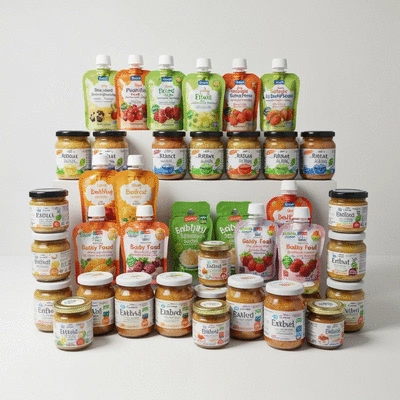
Flavor Variety and Taste Preferences: Finding What Works for Your Baby
Every baby is a unique little individual with distinct likes and dislikes. Some may love sweet potatoes, while others might prefer the tang of peas! Here are some tips for discovering what works best:
- Gradual Introduction: Introduce one new food at a time to gauge your baby’s taste.
- Textures Matter: Experiment with purees, mashed foods, and soft solids as your baby develops.
- Stay Engaged: Make mealtime fun by involving your baby in the process, like letting them touch and explore their food.
By being attentive to your baby's reactions, you can easily establish a repertoire of favored foods that will nourish their growing bodies!
Your Next Steps: Making the Right Decision for Your Family
Now that you have a better understanding of the pros and cons of baby food options, let’s discuss practical next steps for your family. Making informed choices is easier when you have the right resources at your fingertips!
Choosing Resources and Recipes for Homemade Baby Food
Creating homemade baby food can be both rewarding and economical. To get started, find reliable recipes that cater to your baby’s age and nutritional needs. Here’s a list of resources:
- **Best Baby Food Australia:** Our website offers a variety of recipes tailored to your baby's developmental stage.
- **Cookbooks:** Look for reputable books focused on baby nutrition and homemade recipes.
- **Parent Forums:** Engage with other parents for tips, tricks, and recipe swaps!
These resources can make the process easier and more enjoyable for you and your little one! Discover a wealth of ideas and methods in our homemade baby food recipes guide.
Where to Find Reliable Store-Bought Baby Food Brands
When opting for store-bought options, it's essential to choose brands that prioritize quality and nutrition. Look for products that:
- Are free from added sugars and artificial preservatives.
- Use organic ingredients when possible.
- Have clear labeling and provide detailed nutritional information.
Many Australian brands focus on local ingredients, ensuring that you are giving your baby the best possible food. Have you checked your local stores for hidden gems?
Understanding Baby Food Packaging and Storage Options
Finally, let's touch on the importance of packaging and storage. Understanding how to properly store both homemade and store-bought baby food can ensure safety and freshness:
- Homemade Food: Store in airtight containers and use within 3 days in the fridge or freeze for later use.
- Store-Bought Food: Always check expiration dates and follow storage guidelines on the packaging.
- Labeling: If you’re freezing homemade food, label containers with the date and contents!
By keeping these tips in mind, you can maintain the quality of the baby food you serve, ensuring your little one is well-nourished and happy!
Frequently Asked Questions (FAQs)
- 1. What are the main benefits of homemade baby food?
- Homemade baby food offers complete control over ingredients, allowing parents to choose fresh, organic produce and tailor meals to their baby's specific needs and preferences. It also avoids added sugars, preservatives, and artificial ingredients.
- 2. What are the advantages of store-bought baby food?
- Store-bought baby food is convenient and time-saving for busy parents. It is often fortified with essential vitamins and minerals like iron and zinc, and undergoes rigorous testing to ensure safety and nutritional adequacy.
- 3. What key nutrients should I look for in baby food?
- Key nutrients essential for your baby's growth and development include iron (for brain development), calcium (for strong bones and teeth), folic acid (for cell growth), and omega-3 fatty acids (for brain health).
- 4. Is organic baby food truly better for my baby?
- Organic baby food is generally considered a safer choice as it is made without harmful pesticides or artificial ingredients, which can be beneficial for a baby's developing system.
- 5. How should I safely store homemade and store-bought baby food?
- Homemade baby food should be stored in airtight containers and used within 3 days in the refrigerator or frozen for longer storage. For store-bought baby food, always check expiration dates and follow the specific storage guidelines provided on the packaging.
- 6. Can I combine homemade and store-bought baby food?
- Yes, mixing homemade and store-bought baby food can offer the best of both worlds. This approach provides your baby with fresh, homemade flavors while leveraging the convenience and fortified nutrients of store-bought options, adding variety to their diet.
Recap of Key Points
- Control over ingredients with homemade baby food allows for fresh, organic choices.
- Store-bought options offer convenience and are often fortified with essential nutrients.
- Key nutrients to look for include iron, calcium, folic acid, and omega-3 fatty acids.
- Safety considerations are vital; choose reputable brands for store-bought food and ensure proper handling of homemade options.
- A combination of homemade and store-bought baby food can provide variety and cater to your baby's tastes.
- Proper storage of baby food is essential for maintaining safety and freshness.
Popular Posts
 What if I told you that making your own baby food could not only save you money but also give you to
What if I told you that making your own baby food could not only save you money but also give you to
 What if the choice of your baby's food could shape their entire approach to nutrition for life? As y
What if the choice of your baby's food could shape their entire approach to nutrition for life? As y
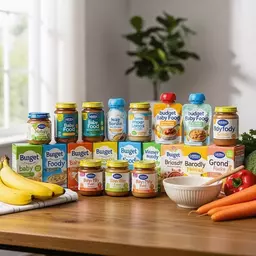 As you navigate the often overwhelming world of baby food shopping, it's essential to arm yourself w
As you navigate the often overwhelming world of baby food shopping, it's essential to arm yourself w
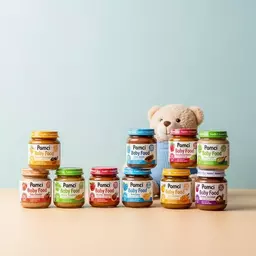 As you embark on the journey of selecting the best baby food for your little one, you might wonder h
As you embark on the journey of selecting the best baby food for your little one, you might wonder h
